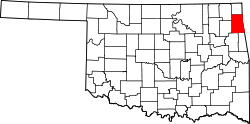2020 census
As of the 2020 census, Jay had a population of 2,425. The median age was 37.7 years. 24.5% of residents were under the age of 18 and 19.0% of residents were 65 years of age or older. For every 100 females there were 92.6 males, and for every 100 females age 18 and over there were 87.9 males age 18 and over. [11] [12]
0% of residents lived in urban areas, while 100.0% lived in rural areas. [13]
There were 940 households in Jay, of which 33.3% had children under the age of 18 living in them. Of all households, 37.1% were married-couple households, 19.1% were households with a male householder and no spouse or partner present, and 36.0% were households with a female householder and no spouse or partner present. About 33.6% of all households were made up of individuals and 15.5% had someone living alone who was 65 years of age or older. [11]
There were 1,114 housing units, of which 15.6% were vacant. Among occupied housing units, 53.1% were owner-occupied and 46.9% were renter-occupied. The homeowner vacancy rate was 2.9% and the rental vacancy rate was 15.4%. [11]
2000 census
As of the census [3] of 2000, there were 2,482 people, 954 households, and 609 families residing in the city. The population density was 767.2 inhabitants per square mile (296.2/km2). There were 1,051 housing units at an average density of 324.9 per square mile (125.4/km2). The racial makeup of the city was 54.43% White, 0.56% African American, 36.50% Native American, 0.04% Asian, 1.89% from other races, and 6.57% from two or more races. Hispanic or Latino of any race were 3.55% of the population.
There were 955 households, out of which 33.0% had children under the age of 18 living with them, 40.9% were married couples living together, 17.8% had a female householder with no husband present, and 36.1% were non-families. 32.6% of all households were made up of individuals, and 15.3% had someone living alone who was 65 years of age or older. The average household size was 2.48 and the average family size was 3.13.
In the city, the population was spread out, with 28.3% under the age of 18, 9.0% from 18 to 24, 27.0% from 25 to 44, 20.1% from 45 to 64, and 15.5% who were 65 years of age or older. The median age was 34 years. For every 100 females, there were 87.7 males. For every 100 females age 18 and over, there were 82.0 males.
The median income for a household in the city was $21,875, and the median income for a family was $25,592. Males had a median income of $20,212 versus $17,039 for females. The per capita income for the city was $10,700. About 21.4% of families and 25.9% of the population were below the poverty line, including 35.1% of those under age 18 and 22.3% of those age 65 or over.



